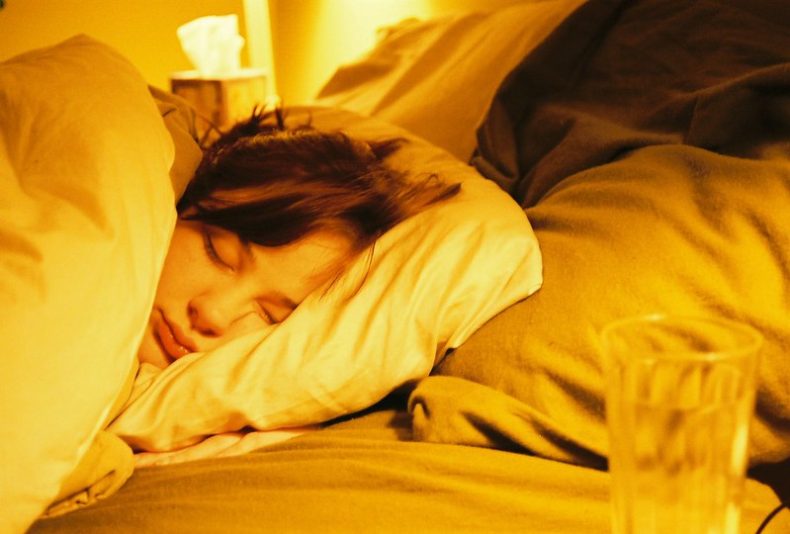
Confession: I, like so many of my fellow Americans, am not getting enough sleep. Blame the baby. Blame the preschooler. Blame COVID anxiety. Blame my doomscrolling. Blame the dog, who threw up a clump of grass next to the bed at 4am.
On a typical night, I sleep between six and seven hours with two baby wake-ups. It’s not enough. My body craves more. So much so that when I snuggle down with my nearly five-year-old to read at bedtime, I am frequently overcome. Her bed is so soft. The stuffed owl behind my head is so squishy. One minute I am reading. The next I am asleep.
Asleep, but still talking. The words tumble out, the story veers off course until I wake to find myself muttering things like, “Bear is my friend.” (My husband once started a pirate story and woke up talking about the pancreas.)
But why? And how? Shouldn’t sleep serve as a kill switch for the mouth?
Not so much. According to a very unscientific survey of my Facebook friends, this particular brand of sleeptalking or — if you’re fancy, somniloquy —- is a common side effect of parenthood. It could be all that sleep parents of young children aren’t getting. Sleep deprivation does seem to increase the likelihood of sleep talking.
One friend’s husband asked “Do you like Barbie?” Another friend’s wife added Hermione Granger to a story that was decidedly not about Hermione Granger.
The research on somniloquy is scarce, perhaps it’s mostly harmless. According to a recent review of the topic, researchers can’t even agree on the prevalence: Estimates of the proportion of adults who currently sleep talk range from 3% to a nearly 60%.
Why humans sleep talk isn’t clear either. Are we babbling nonsense? Are we narrating our dreams? The latter certainly seemed to be true of Dion McGregor, a 1960s songwriter and one of the world’s most famous sleep talkers. Much sleep speech consists of short phrases that are often mumbled or unintelligible. But McGregor enunciated, and he could go on and on and on. His roommate, who was fascinated by McGregor’s night ramblings, recorded hundreds of hours his sleep speech. Here’s a sample: “Do you know Edwina didn’t even cry when that crocodile popped off her leg? She didn’t even cry, Edwina. She was fascinated, just fascinated. Her mother fainted dead away, and her father fainted dead away. Half the attendants fainted dead away. And Edwina just stood there and watched him chew up her leg… You know what? She said she always wanted to be Long John Silver!” These recordings were later released as albums that sold, as you might expect, rather poorly. (Listen to this one about the mustard battle.)
But I’m skeptical that my ramblings have anything to do with my dreams. The transition happens too quickly. One minute I’m happily reading about a pet pig, and the next I’m babbling about pineapples or poodles or pumpkins. The scientific literature has nothing to say on the matter. I couldn’t find a single study that looks at speech that crosses the sleep-wake boundary. Isabelle Arnulf, a neurologist at Pierre and Marie Curie University in Paris, France, says that most studies of people fighting off sleep have focused on changes in performance for activities like driving. And that makes sense. The stakes are higher. Fall asleep driving, and you might kill someone. Fall asleep while reading “How to Catch a Unicorn,” and you only risk irritating your child.
But Arnulf has seen some examples of the kind of thing I describe in people with profound sleep disorders like narcolepsy. One patient, for example, dozed off while speaking at a business meeting and mentioned “his little rabbit.” The audience’s laughter woke him. Another was jotting down driving directions. She wrote the name of the highway and the town, then drifted off and wrote, inexplicably, “and we will live together.” By the third line she was awake again and continued with the directions.
A few years ago, Arnulf and her colleagues conducted a study of the syntax and semantics of sleep talking in more than 200 adults in France. Their results suggest that the brain may be asleep, but it is far from offline. Sleep talkers used proper grammar, they paused to let (imaginary) conversation partners talk, and they engaged in frequent conflicts. The most common utterance was “no.” But the researchers also recorded a surprising amount of profanity and aggression, including these gems:
“Pull a little! Pull a little! Pull a little! Here it is. Something wrong? Uh, pull! But bloody hell, pull!”
“Liar! I’ll slap you in the face if you sign it”
“You’re a little bitch, because you are rambling in the streets”
I take some comfort in the fact that I have yet to transition from unicorns and mermaids to profanity. But who knows what tomorrow will bring? Bear is my friend, but we all know he can also be quite the little bitch.
****
Image courtesy of Jon Huss via Flickr
I don’t know about sleep talking, but I’ve done my share of sleep knitting. Seems my sleep knitting default is knit 2, purl 2 as opposed to whatever pattern is supposed to be worked. Even if it’s as easy as garter stitch which is just knit every stitch whether right side or wrong side. I find out the mornings after – it’s a recurring event that involves much cursing and fixing.